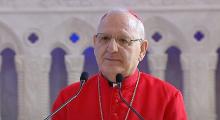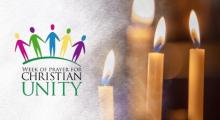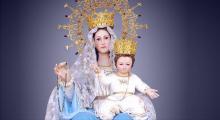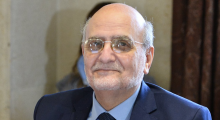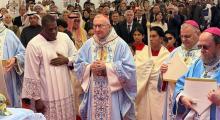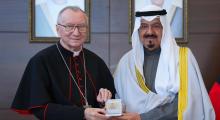Issued by the Catholic Center for Studies and Media - Jordan. Editor-in-chief Fr. Rif'at Bader - موقع أبونا abouna.org
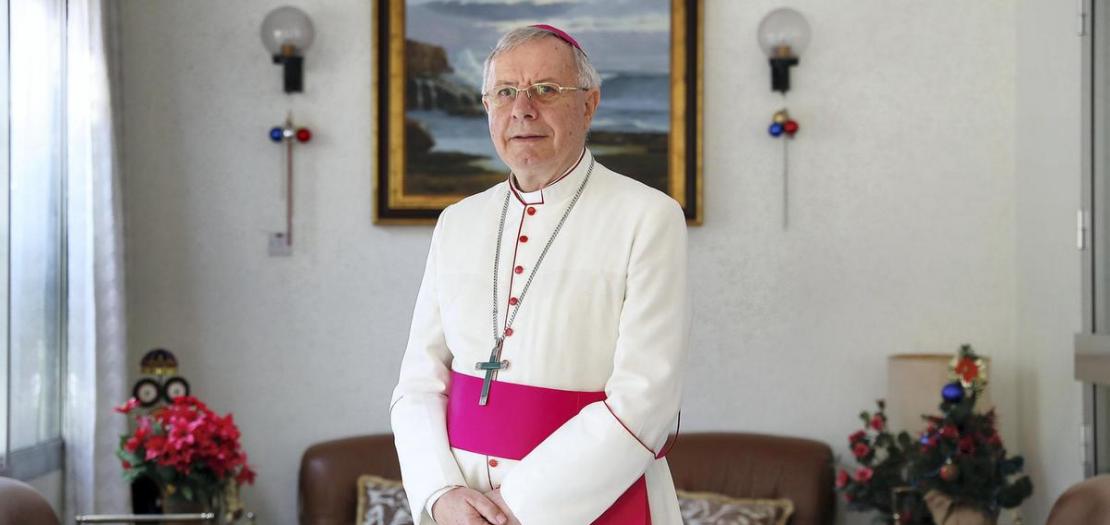
As the world battles the COVID-19 pandemic, Apostolic Vicar of Souther Arabia Bishop Paul Hinder has offered his people meaningful and comforting reminders: we are “in the world, not of the world”; we never fall out of the Lord’s protective hands; with Jesus, we are never shipwrecked.
Bishop Paul Hinder, OFM Cap, the Apostolic Vicar, expressed this to all faithful in the Apostolic Vicariates of Northern and Southern Arabia in a recent pastoral letter. Pope Francis visited Abu Dhabi, Feb. 3-5, 2019, marking the first visit of a Roman Pontiff to the Arabian Peninsula and the first Mass of a Pope in Arabia.
Bishop Hinder, Franciscan, born in Switzerland, is the former auxiliary bishop (from 2003) and Apostolic Vicar (from 2005) of Arabia, namely Yemen, Oman, Saudi Arabia, Qatar, Bahrain and United Arab Emirates. In 2011, the Arabian Vicariate was divided and he became the Apostolic Vicar of Southern Arabia, including Yemen, Oman and the United Arab Emirates. In this territory, Catholics, all foreigners, are about a million. Engaged above all in some sectors (construction, school, services and domestic work), they come from over 100 countries: mainly Philippines, India and other Asian countries.
“We are all passing through a difficult time since the Covid-19 pandemic has troubled our life in many ways,” the Apostolic Administrator of Northern Arabia begins, before offering reflections, taking a word from St. John’s Gospel, in the long prayer of Jesus on the evening of the Last Supper, as his starting point. “After washing the feet of his disciples and before entering into his Passion, Jesus addresses the Father and prays for his disciples: ‘I am not asking you to take them out of the world, but I ask you to protect them from the evil one.” (John 17:15)
The Swiss prelate then spoke about our place amid the real world, which at times, especially amid a pandemic, may seem uncertain. “To believe in Jesus Christ and to be a member of his Church does not automatically place us into a paradise. We are neither saved from Covid-19 nor from other calamities simply because we believe in the Lord. Like everybody else, we are exposed to the risks that exist in a contaminated world.”
“We cannot pretend that we can expect special treatment from God in this regard only because we believe in his Son, Jesus Christ. In his prayer before the Passion, Jesus does not ask the Father to take his disciples out of the world. He only asks the Father “to protect them from the evil one”. “The evil one” does not refer to sickness, accident, famine, war and similar adversities, but to the devil who can take us into his grip, make our soul fatally sick, and cut us off from friendship with God.”
Yet the question, he said, remains: “how should we Christians deal with this situation? What are the answers to the questions that trouble our minds and may cause a lot of doubt in our hearts?”
Looking at history, he recalled that from the beginning, Christians had to learn by painful experience what it meant to be in the world but not of the world, noting Jesus’ followers “were often exposed to an environment that was anything but friendly to the new faith of the Christians.”
They Did Not Withdraw…
Regardless, the faithful did not withdraw from the society in which they lived nor did they fall into a collective self pity, but rather, he said, “committed themselves to the public and social life, often risking their own lives.”
Noting Christians are called to be the “soul” to the world, their sacrifice, he explained, shows the seed of a totally different lifestyle, one rooted in the example and the word of Jesus Christ, that was spread and produced fruit. “Amidst their struggles, Christians were proud of their identity. They were convinced that although small in number, they could change the world.”
“Sometimes I wonder if we, unlike those early Christians, are no longer proud of our identity as Catholics. Perhaps this is because of the undisputable scandals that happened (and still unfortunately happen) among us and within the Church. Paralyzed by such shocks, we are no longer able to live with the serenity and hope that Saint Paul expresses in his letter to the Philippians: “Forgetting what lies behind and straining forward to what lies ahead. I press on toward the goal for the prize of the heavenly call of God in Christ Jesus. Let those of us then who are mature be of the same mind” (Phil 3:13-15).
While we must address the mistakes of the past, we are called to live the Good News of our Lord Jesus Christ with courage in the present. Facing the challenges of today’s world, we have to avoid paths that lead us astray. He warned against one error of withdrawing ourselves from society, “and hiding in our own religious ghetto as certain groups tend to do” being “critical observers or even judges of the world” and the other error of “melting into the surrounding world and to behave as everybody else, regardless of whether such behavior is good or bad.”
Salt of the Earth — Light of the World
“We would lose our Christian identity. Jesus warns us: “If salt loses its taste, with what can it be seasoned? It is no longer good for anything but to be thrown out and trampled underfoot” (Mt 5:13). Neither of the two paths are truly Christian. Jesus wanted us to be “light(s) of the world” (Mt 5:14) and “salt of the earth” (Mt 5:13). And he wanted us to be these things amidst the world.”
For this reason, he says, Jesus prayed for us before his Passion. “Therefore, while we live as everybody else in this world,” he stressed that “we do so with a clear difference: we live as people who are “sanctified in the truth”. Being sanctified in the truth means to be made holy by the One who said, ‘I am the truth’ (Jn 14:6)”
Bishop Hinder quoted Saint Paul’s words to the Romans: ‘Do not be conformed to this world but be transformed by the renewing of your minds, so that you may discern what is the will of God – what is good and acceptable and perfect’ (Rom 12:2).
Dangers of Relativism
The Apostolic Vicar based in Abu Dhabi recognized how from our own experience, we know how easily we become conformed to this world “instead of being transformed through the renewal of our minds.
“We live in a world where the powerful whirlpool of moral and doctrinal relativism can easily draw us away from following the path of God’s Commandments,” he said.
The Lord rebuked Solomon for being led astray: “You turned away your heart”. This also occurs in our lives. Most of us do not commit great sins, but the danger lies in “letting ourselves slide slowly because it is an anaesthetized fall”. Without realizing it, things become relativized and we lose our faithfulness to God. How “often (do) we forget the Lord and begin to deal with other gods” such as money, vanity and pride! “For us”, Pope Francis explained, “this slippery slide in life is directed towards worldliness” believing it is alright because “everyone is doing it”. As we justify ourselves in this way, we lose our faithfulness to God and embrace modern idols. (L’Osservatore Romano, Weekly Edition in English, n.12, 20 March 2020)
What happened to Solomon, he warned, can happen to anyone of us, since we often want to please everybody and make their gods our gods.
We also, he noted, cannot expect special treatment from God in this regard only because we believe in his Son, Jesus Christ. Jesus did not ask the Father to take his disciples out of the world, but “to protect them from the evil one”. “’The evil one,'” he said, does not refer to sickness, accident, famine, war and similar adversities, “but to the devil who can take us into his grip, make our soul fatally sick, and cut us off from friendship with God.”
Yet, he underscored, the question remains: how should we Christians deal with this situation? What are the answers to the questions that trouble our minds and may cause a lot of doubt in our hearts? Looking back in history, we see right from the beginning, that Christians had to learn by painful experience what it meant to be in the world but not of the world.
Freeing Ourselves of Worldliness
A question that must bother every well-intended Christian, Bishop Hinder said, is: how can we preserve our Christian identity in a world that follows values quite different from our own, without separating ourselves from it?
“It is time once again to discover the right form of detachment from the world” and away from worldliness as a whole. The present pandemic, he said, has the potential to awaken us from the sleep of false security. We may have taken too many things for granted, and likely need to adapt to new conditions.
“All these experiences and many more,” he said, “make us aware that living the faith in community is more than fulfilling certain acts which we consider as an obligation for a practicing Catholic.” “It will be our task as Christians,” he continued, “to do everything that is in our power to fight against a general climate of suspicion and exclusion.”
“Normal healthcare and prudence, yes; hysteria and excessive concern, no!” he urged. “Of course,” he recognized, “we are bound by the rules of the civil authorities. However, we should not take these rules as an excuse for our lack of mutual care as members of the same Christian community and the basic human family.”
We Never Fall Out of the Lord’s Hands
The prelate called for confidence, not panic as we ask how are we to cope with this situation as believers in Jesus Christ. “He taught us to understand ourselves as sons and daughters of the heavenly Father who loves us through and through. Does this mean that we have always a happy life? No! However, it means that even in situations of distress and utmost trials we do not fall out of his hands.”
Saint Paul, who had to suffer a lot during his lifetime, hammered into the hearts of the Romans the truth of God’s love in Christ Jesus with the following words:
“Who will separate us from the love of Christ? Will hardship, or distress, or persecution, or famine, or nakedness, or peril, or sword? … I am convinced that neither death, nor life, nor angels, nor rulers, nor things present, nor things to come, nor powers, nor height, nor depth, nor anything else in all creation, will be able to separate us from the love of God in Christ Jesus our Lord” (Rom:8:35.38-39).
We tremble and suffer with all the other humans, but we believe that there is the Father of our Lord Jesus Christ who will not abandon us, not even in death. The risen Lord is the warrant for this conviction.
Pope Francis, during the very moving March 27, 2020 “Urbi et Orbi” prayer, challenged our faith with the words of Jesus addressed to his disciples in the situation of the sea-storm: “Why are you afraid? Have you no faith?” When we realize we are in need of salvation, the Vicar says, faith begins.
“We are not self-sufficient, by ourselves we are lost: we need the Lord like ancient navigators needed the stars. Let us invite Jesus into the boats of our lives. Let us hand over our fears to him so that he can conquer them.”


